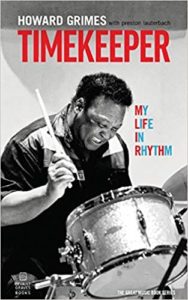“When we cut [Ann Peebles] ‘I Can’t Stand the Rain’ the track was tight, but naked. [Producer] Willie Mitchell thought it needed something. I saw these timbales sitting in the corner. I’d never messed with them before. A [television] commercial came into my mind about a coffee percolator. I made the timbale drip like coffee bubbling in a percolator. Teenie [Hodges] picked up on the last note and blended his guitar with the timbale. That’s what makes the intro. John Lennon called it the best song ever.”
 This is just one of many fascinating first-person recollections from the legendary Memphis drummer Howard Grimes. Nicknamed “Bulldog” because of the aggressive rhythms he laid down, Grimes is perhaps best known for playing on the enduring hit records of Al Green. Grimes, who began playing as a teenager backing up Rufus Thomas, went on to become the house drummer for both Stax and Hi Records. A walking encyclopedia of Memphis music, Grimes witnessed the birth and demise of both labels, blaming it not on just poor business decisions or lack of talent, but on pure greed. Sounds a bit like New Orleans.
This is just one of many fascinating first-person recollections from the legendary Memphis drummer Howard Grimes. Nicknamed “Bulldog” because of the aggressive rhythms he laid down, Grimes is perhaps best known for playing on the enduring hit records of Al Green. Grimes, who began playing as a teenager backing up Rufus Thomas, went on to become the house drummer for both Stax and Hi Records. A walking encyclopedia of Memphis music, Grimes witnessed the birth and demise of both labels, blaming it not on just poor business decisions or lack of talent, but on pure greed. Sounds a bit like New Orleans.
At Stax, and also pre-Stax, Grimes played on Carla Thomas’ early hit “Gee Whiz,” Al Bell’s “You Don’t Miss Your Water” and even on “Last Night” by the Mar-Keys, a Memphis frat band which featured Steve Cropper and Duck Dunn. In fact, he had a chance to play on “Green Onions” by Booker T and the M.G.s but was playing baseball with his friends when the studio called to do the session. Thus, his lack of interest helped open the door for another great Memphis drummer/producer, Al Jackson Jr. Actually, Jackson and Grimes swapped places as Grimes replaced Jackson to play with Willie Mitchell’s influential Memphis band. Besides having the band, Grimes ran Royal Studios and produced records with an iron fist at Hi and occasionally for out-of-town studios like the New Orleans Frisco label that recorded Danny White.
Once Grimes became the “pocket-locker,” his drumming became valuable for the Hi/Memphis sound. “Willie had the vision to bring O.V. Wright, Ann Peebles, Al Green, Otis Clay and Syl Johnson to sing with us,” Grimes writes in Timekeeper. “But one constant on those records is the Hi Rhythm Section. There are some good studio bands out there, but I don’t know any of them that could hang with us hit for hit.”
This an informative, breezy read containing many colorful stories about life in the studio, on the road and at home. Readers should flip pages of the book while listening to the excellent Hi Times box set, or any LPs by Ann Peebles, Al Green or O.V. Wright if you are lucky enough to still have them.




